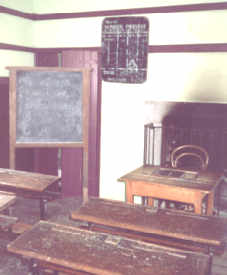Reading Books
From the 1830s, primary or national-school education was available generally to both boys and girls in the cities and towns of Ireland. There were five reading books published by the commissioners which had to be used in all national schools. All of these books contained a great deal of moral tales. For the boys there were stories told about self-made men such as James Ferguson and William Hutton who became successful by virtue of hard work, self-denial and frugal habits. There were few references to fatherhood, whereas most of the stories for girls emphasised the importance of preparing to be a mother.
In the Reading book for female schools (1854) a character like Lucy Nevers 'who knows how to make herself very useful to her mother and her older sisters' was put before girls in national schools. Women's main virtues were seen as their gentleness, cheerfulness, modesty, kindness,sympathy and their hard work.
I have always remarked that women in all countries are civil, obliging, tender and humane; that they are ever inclined to be gay and cheerful, timorous and modest. They do not hesitate, like men to perform a hospitable or generous action; not haughty nor arrogant nor supercilious, but full of courtesy, and fond of society; industrious, economical, ingenuous, more liable in general to err than man, but in general, also more virtuous, and performing more good action than he.
Quoted by Lorcan Walsh, 'Images of women in nineteenth century schools' in Irish educational studies, Vol. 4, No. 1, 1984, p. 82. |
In a lesson on 'Management of the Sick', girl students were told::
It has often been remarked, that in sickness, there is no hand like a woman's hand, no heart like a woman's heart; and there is not. A man's breast may swell with unutterable sorrow ... yet place him by the sick couch ... let him have to count over the long, dull hours of night ... let him be appointed to this ministry ... and his grosser nature ... will tire; his eye will close, and his spirit grow impatient of the dreary task; and, though love and anxiety remain undiminished, his mind will own to itself a creeping or irresistible selfishness, of which indeed he may be ashamed, and which he may struggle to reject, but which, despite all his efforts, remains to characterise his nature, and prove in one instance at least, his manly weakness.
Quoted by Lorcan Walsh, 'Images of women in nineteenth century schools' in Irish educational studies, Vol. 4, No. 1, 1984, p. 82. |
|
The main emphasis in this reading book was on the domestic duties of a young girl, which included the art of cookery and lessons on the furnishing of a house. Punctuality, order and cleanliness were the great virtues put forward for the proper management of a home.
There was no mention of the Irish language in any of these reading books as Irish was not allowed to be taught in national schools until 1879 when permission was given to teach it outside school hours. Irish history was another subject which did not feature on the national school curriculum, thus adding to the sense of cultural loss.
|

Rural national school
As recreated at Bunratty Folk Park |
The Christian Brothers were outside the national school system so they were free to teach the Irish language in their schools. They could also use their own reading books which aimed to foster patriotism by writing about Irish heroes of the past but these were not allowed in national schools under the National Board. As a result girls in national schools, generally speaking, were more anglicised, as they were taught neither Irish history nor the Irish language.
Questions
- Describe the kind of woman held up as a role model for girls in the Reading book for female schools (1854).
- Discuss the way men are represented in the Reading book for female schools (1854).
- Suggest reasons why the Irish language and Irish history were not regularly taught in Irish national schools during the nineteenth century.
Activities
- Role play two men discussing the way men are represented in Reading book for female schools (1854).
- Role play a concerned mother and father discussing the ways in which women and men are represented in Reading book for female schools (1854).
